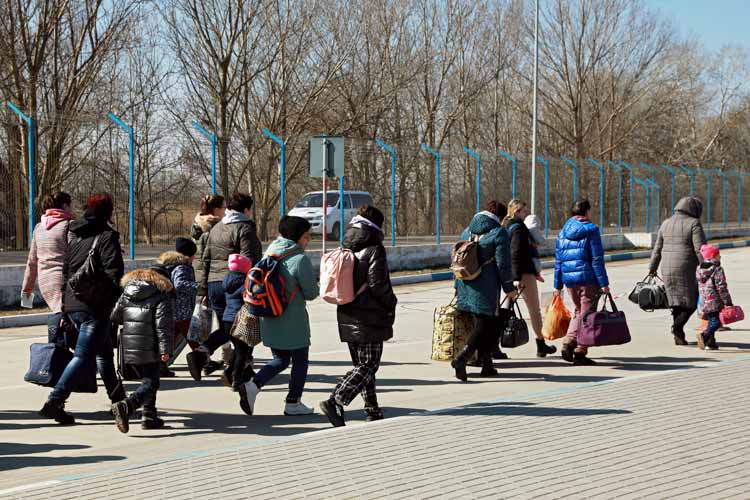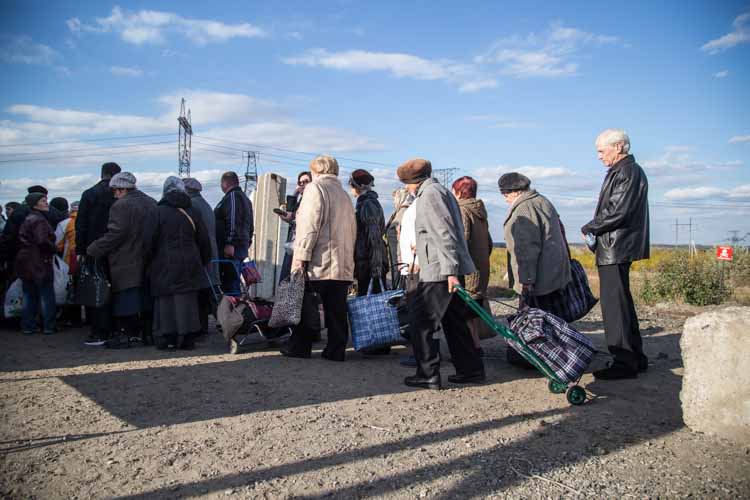1 August 2022
At Anti-Slavery International we continue to be concerned about the risk of modern slavery to those who have fled Ukraine. That’s why we have been working collaboratively with the Ethical Trading Initiative (ETI) alongside businesses, other civil society actors and wider networks to develop guidelines for supporting the safe employment of people fleeing Ukraine, reducing their risk of being exploited.

EU / Wojtek Radwanski
As the number of people who have crossed the border from Ukraine since 24th February 2022 has reached over 9.5 million people as of July 2022, Anti-Slavery International continues to work to make sure there are adequate protections in place. As people fleeing Ukraine seek work elsewhere, one of the key risks we are watching is the risk of exploitation as they seek or work in new jobs. We have been working in partnership with the Ethical Trading Initiative (ETI), businesses such as TFG London (owner of Hobbs, Phase Eight and other brands) and other civil society actors to develop a guidance document for businesses and governments. The document, “Guidelines for employment and integration of people displaced from Ukraine” (Guidelines) provides a roadmap for how suppliers can support the safe employment of those fleeing and reduce the risk of exploitation.
Risk to people fleeing the conflict
La Strada International, an international NGO network addressing trafficking of persons, of which we are a member, has comprehensively outlined the multiple risks to people fleeing the conflict. These risks include a rise in online and on-the-ground recruitment, which have no safeguards against exploitation. Multiple barriers, including a lack of social support, language barriers or access to clear information on their rights, are also placing people at greater risk. There is also a risk of exploitative practices being linked to the products and services of global companies, with an increased risk in cases where companies have little visibility over conditions in their supply chain.
The role of businesses
Businesses have a crucial role in preventing the exploitation of people in their operations and supply chains. This action needs to be in place beforehand, in order to prevent labour exploitation, including modern slavery in their workplaces. If business instead wait to react to concerns, this will be too late to provide adequate protection. Lessons need to be taken from other humanitarian crisis, such as those learned from company action following exposés about the exploitation of Syrian refugees in Turkey.

Photo: Mayorsk, Ukraine EU/ECHO/Oleksandr Ratushniak
Developing the Guidelines
In order to make the Guidelines as holistic as possible, we have taken a collaborative approach, working together with ETI members from across business, civil society and across wider networks, incorporating intelligence, learnings and best practice. We have also applied a gendered lens, to make sure that uniquely gendered impacts are considered. This collaborative approach is vital in order to produce a holistic response to support safe recruitment practices and working conditions for people fleeing conflict.
We took learnings from previous industry practice, such as NEXT’s Syrian Refugee Action Plan for Turkey which was highlighted in the Business and Human Rights Resource Centre’s (BHRRC’s) analysis of company action during the ongoing crisis. In addition to building on this existing research, we have consulted with various stakeholders to understand the specific risks being faced by those fleeing Ukraine, to feed into the Guidelines.
The Guidelines have been developed to support large companies and suppliers in providing decent work for all. They outline what responsible business practices companies must adopt to support people fleeing conflict in their supply chain. This includes key areas for supporting the employment of asylum seekers and refugees and preventing exploitation, including ethical recruitment practices and meaningful grievance mechanisms, which are fundamental for enjoying the right to decent work. They also detail the importance of providing workers with contracts and information about their rights in a language that they understand, with specific remediation plans to address any abuses that may occur.
These Guidelines cover several core areas, including:
- Recruiting displaced workers from Ukraine
- Commencing employment and language requirements
- Documentation and payment of wages
- Accommodation and transport
- Supporting workers’ integration and wellbeing
- Beyond your company
While the Guidelines shouldn’t be read as an exhaustive or comprehensive list of responses, they provides helpful do’s and don’ts for each area to inform ethical practice in supporting people fleeing conflict and reducing the risk of exploitation. They are available to download in English, Italian, Polish, Romanian and Ukrainian, with a database of local resources and support.
Out of these Guidelines, we are beginning work to develop more in-depth and context-specific guidance around mitigating the risks to those who have been displaced from Ukraine, with learnings which will be useful in future crises. This should provide more of a comprehensive understanding of the specific risks to workers in different countries and how suppliers can appropriately support them. We intend to publish these guidelines by the end of 2022.
Call on companies to take action
We encourage all companies to share the Guidelines with their suppliers. This is crucial for responsible business practice, to prevent exploitation from occurring within supply chains and to support the employment of people who have been displaced. Write to businesses and call on them to implement the Guidelines!
We emphasise the risk to people fleeing all global conflicts. It is crucial that the lessons from the Guidelines be used to support all to enjoy the right to decent work and to encourage further collective action.
Find out more about how we work with businesses.





